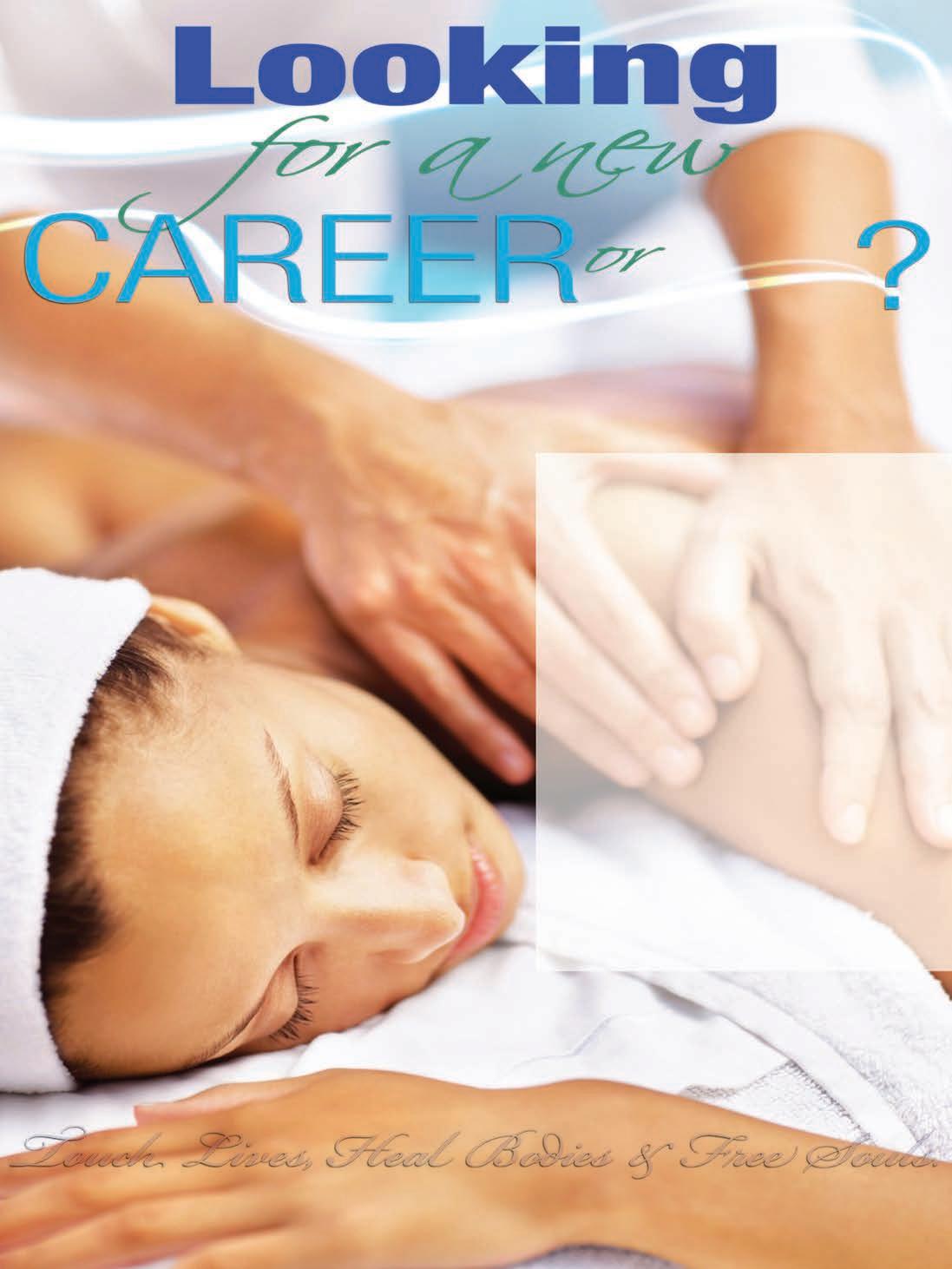THE JOY OF FISH AQUARIUMS OFFER RELAXING ENTERTAINMENT

Going Green at the University
SCHOOLS AIM FOR CARBON NEUTRALITY

Food Freedom at School
STRATEGIES FOR FOOD-RESTRICTED STUDENTS
TIPS TO STOP ACNE OUTBREAKS

THE JOY OF FISH AQUARIUMS OFFER RELAXING ENTERTAINMENT

Going Green at the University
SCHOOLS AIM FOR CARBON NEUTRALITY

Food Freedom at School
STRATEGIES FOR FOOD-RESTRICTED STUDENTS
TIPS TO STOP ACNE OUTBREAKS
BENEFITS OF BEING THE FOREVER STUDENT








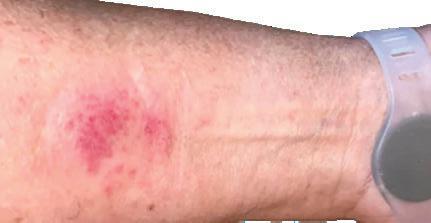












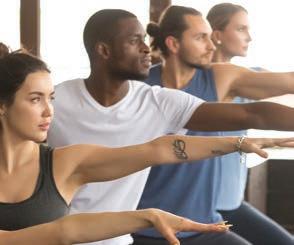

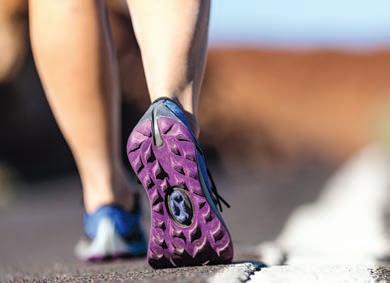
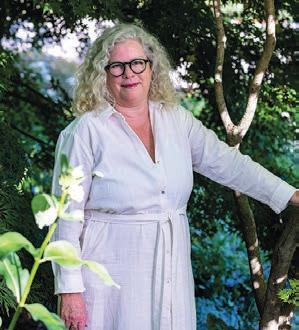

Natural Awakenings is a network of natural lifestyle magazine publishers empowering local communities with knowledge, resources and connections to lead healthier lives on a healthy planet.


To advertise with Natural Awakenings or request a media kit, please email PhoenixAds@NaturalAZ.com
Deadline for ads: the 10th of the month.
EDITORIAL
Go to NaturalAZ.com/pages/contact to inquire about editorial opportunities. Deadline for editorial: the 10th of the month.
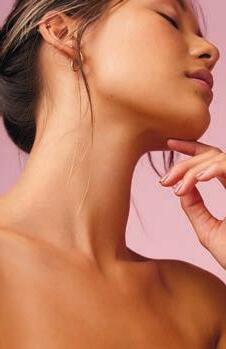
CALENDAR
Calendar events are online only, and can be submitted at NaturalAZ.com/calendar
NATIONAL
Advertise your products or services in multiple markets!
Natural Awakenings Publishing Corp. is a growing franchised family of locally owned magazines serving communities since 1994. To place your ad in other markets call 239-206-2000. For franchising opportunities call 239-206-2000 or email NaturalAwakenings@KnoWEwell.com.

Tracy Patterson, BSc, MES DESIGN & PRODUCTION
Vegetorium, LLC

COPY EDITOR
Sara Gurgen
DIGITAL PLATFORMS
Hass Solutions Locable
Natural Awakenings – Phoenix 17470 N Pacesetter Way
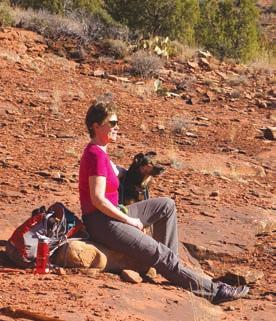
Scottsdale, AZ 85255
Tracy@NaturalAZ.com NaturalAZ.com

CEO Kimberly B. Whittle

National Editor Sandra Yeyati
Editor Brooke Goode
Copy Editor/Proofreader Melanie Rankin
Design & Production Gabrielle W-Perillo
National Advertising Lisa Doyle-Mitchell
The beauty of a niche magazine is that it’s a small, targeted publication chock-full of information focusing on specific topics; as you know, Natural Awakenings’ emphasis is on “healthy living, healthy planet.” When readers, like yourself, pick up a copy, they know they can expect healthconscious and eco-conscious material.
The challenge with a niche magazine like Natural Awakenings Metro Phoenix & Northern Arizona is the distribution in this huge territory—almost 5 million people! It's simply not feasible to provide enough magazine pickup locations in every neighborhood over such a large area. We’ve done our best over the years, and also provide a digital edition for those who either can’t find a copy or prefer the no-paper option.
The good news is that starting with this edition, we will now be in almost 50 Safeway stores across the Valley, along with nearly 20 Albertsons and one Whole Foods. We are also in hundreds of independent locations. If you’ve had trouble finding a copy of Natural Awakenings, chances are you’ll be able to pick one up at your nearest Safeway or Albertsons. Below is a list of the supermarket chains we are now in.
© 2023 by Natural Awakenings. All rights reserved. Although some parts of this publication may be reproduced and reprinted, we require that prior permission be obtained in writing.
Natural Awakenings is a free publication distributed locally and is supported by our advertisers. Please contact us to find a location near you.
We do not necessarily endorse the views expressed in the articles and advertisements, nor are we responsible for the products and services advertised. Check with a healthcare professional regarding the appropriate use of any treatment.



Enrollment is now open for fall and winter courses at Trinity School of Natural Health, a premier resource for holistic health education, with graduates from all 50 U.S. states and more than 40 countries. Founded in 1991, the school’s diverse online curriculum provides comprehensive knowledge and skills to help turn a passion for healthy living into a fulfilling career. Graduates often use their education in private practices, group clinics, retail stores, online businesses, public education or writing jobs.
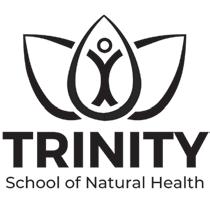
Certifications are available for a wide range of natural health specialties, including health coaching, naturopathy, aromatherapy, homeopathy, holistic fitness, herbalism, iridology, nutritional consulting and ZYTO bioenergetics. Led by instructors with practical expertise, these online courses provide students the flexibility to work when their schedules allow, while offering interactive and structured classroom settings to keep students motivated and on the path toward graduation.
Programs begin every four weeks. For more information or to enroll, call an enrollment specialist at 800-428-0408, option 2, or visit TrinitySchool.org. See ad, page 4.


Purple Lotus Productions is excited to announce the muchanticipated return of the popular, family-friendly Embracing Your Journey Expos. The next one will be held on Saturday, September 23, from 10 a.m. to 5 p.m., at the New Vision Center for Spiritual Living, in Phoenix—a spacious open-air facility with a multitude of indoor vendor spaces, ample parking and a convenient location. The expo will feature more than 35 holistic, wellness and metaphysical vendors; free lectures; a labyrinth walk; and raffle prizes.
“I am so grateful that we have returned to a time where we can gather again to reconnect with old friends and make new ones,” shares Erin McNamara, who started Purple Lotus Productions in 2009 along with her daughter, Robin Selby. “It is so delightful to feel that sense of community with shared ideas and experiences, smiles, laughter, discussions and hugs.”
Adds McNamara: “This family-friendly event is open to everyone, so come spend the day learning, growing and discovering while you ‘embrace’ your journey with us. Grab the family, bring a friend or have some ‘me’ time and explore ways to live a more healthy, holistic, green life. Enjoy great company, free lectures and over 35 amazing vendors offering art, crystals, cool clothes, energy healing, angel readings, jewelry, aromatherapy, astrology, psychic readings, self-care products, herbs, chiropractic and more.”
Cost: Admission is $5. Location: 18010 N. Tatum Blvd. For more information, visit EmbracingYourJourneyExpo.com. To purchase tickets, visit Eventbrite.com/e/666610278287. See ad, page 17. Advertorial
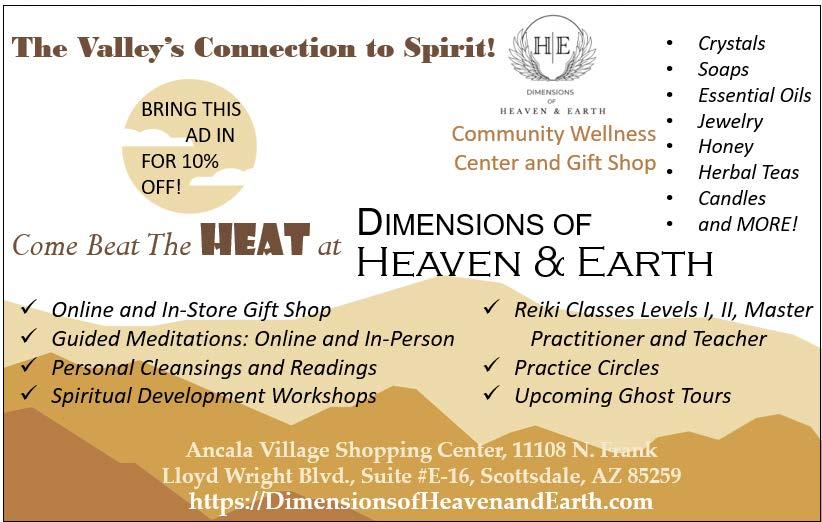
out of 10 children suffer from


If you are out of town, traveling or its just too darn hot to get to the shop but need something, please feel free to order online: www.SWHerb.com/shop Use HERBS coupon code for free shipping. Phone/curbside service available, too!
Our next Herbal Certi cation Class starts October 14th, taking reservations 5 Saturday mornings from 9 am to 2 pm Last one of 2023, claim your seat now!
Our online store is EASY TO USE and AWESOME: www.SWHerb.com/Shop
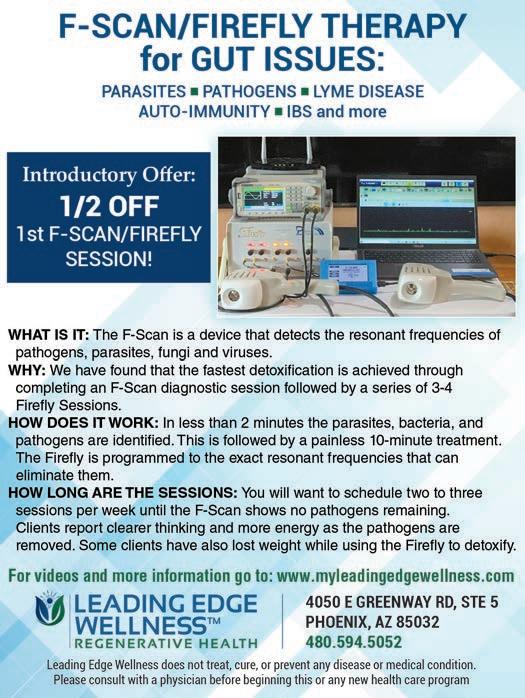
Research indicates that lutein is essential for eye health, suppresses inflammation and offers cardiovascular health benefits. Because the human body cannot make this powerful antioxidant, it is important to include it in the diet by eating dark, leafy vegetables, such as spinach and kale.
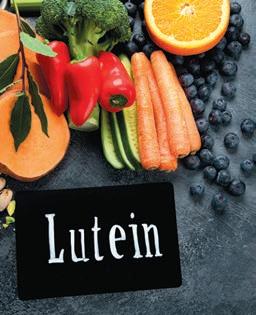
A new study in the journal Nutrients has found that coconut milk is the most effective plant-based milk to liberate lutein from spinach in green smoothies. The scientists from Linköping University, in Sweden, tested 14 liquids, and only four increased lutein liberation in spinach smoothies. Compared to blending spinach with water alone, coconut milk without additives was found to improve lutein liberation by 42 percent. Improved lutein liberation was also found with high-fat cow’s milk (36 percent), medium-fat cow’s milk (30 percent) and coconut milk with additives (25 percent). Researchers noted that soy milk with and without additives actually reduced lutein liberation by 40 percent and 61 percent, respectively.
One in six pregnancies ends in miscarriage. While there are many known causes, including chromosomal problems and infections in the womb, nearly half of pregnancy losses remain unexplained.

Researchers at the University of Birmingham, in the UK, analyzed 20 studies that examined the eating habits of 63,838 healthy women of childbearing age in the months before and shortly after conception to see whether there was evidence of an association with a lower or higher chance of miscarriage. The review, published in the journal Fertility and Sterility, found that, compared to low consumption, high intake of fruit was associated with a 61 percent reduction in miscarriage risk, and high vegetable intake was associated with a 41 percent reduction.
Risk reduction was also linked to dairy products (37 percent), grains (33 percent), seafood (19 percent) and eggs (19 percent). The evidence was uncertain for red meat, white meat, fat and oil, and sugar substitutes. The researchers looked at whether specific types of diets (such as the Mediterranean Diet or Fertility Diet) were also linked to miscarriage risk, but they could not find evidence that following any of these diets lowered or raised risk.
A new study in the journal PAIN Reports conducted by researchers at University Hospitals Connor Whole Health, in Cleveland, looked at patient outcomes in pain reduction after music therapy. The study examined music therapy interventions provided to 1,056 adults that reported moderate to severe pre-session pain, anxiety or stress. Interventions included listening to live, music-assisted relaxation and imagery, and active music making. After a single music therapy session, the patients reported clinically significant reductions in pain, anxiety and stress.
Additionally, patients receiving a music therapy session in which pain management was a goal were 4.32 times more likely to report pain reduction than those receiving the therapy without such a goal. While music therapy may be an effective, non-drug therapy for acute pain and distress management, additional research is needed to determine which characteristics of music therapy interventions influence pain improvements.
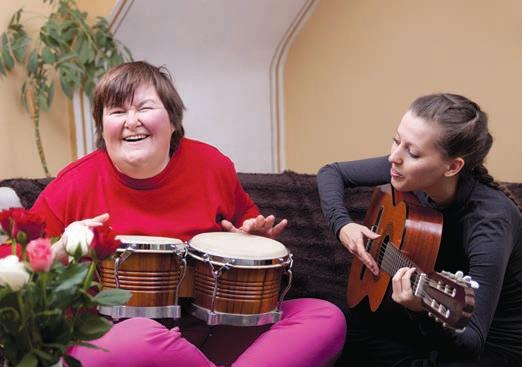
According to the National Oceanic and Atmospheric Administration, El Niño and La Niña are the warm and cool phases of a climate pattern across the tropical Pacific. The patterns shift back and forth every two to seven years and vary in strength, causing changes in ocean temperature that lead to droughts, floods and heat waves in different parts of the world.

El Niño has the strongest influence on U.S. winter weather, but in the summer, it reduces hurricane activity in the Caribbean and Atlantic. The pattern also makes it wetter across the southern third to half of the country, including California, while regions in the Pacific Northwest and parts of the Ohio Valley are dry and warm. Outside the U.S., El Niño brings drier weather to Australia, Indonesia, India, and parts of southern Africa and northern South America, and wetter conditions in Southeast Argentina, parts of Chile and Northeast Africa.
This year’s El Niño formed earlier than usual, increasing the possibility of a strong effect on the weather, which when combined with human-caused warming, could result in record high global temperatures. Experts also say it is possible that record hot Atlantic Ocean water may counteract El Niño’s usual suppression of hurricanes this year.
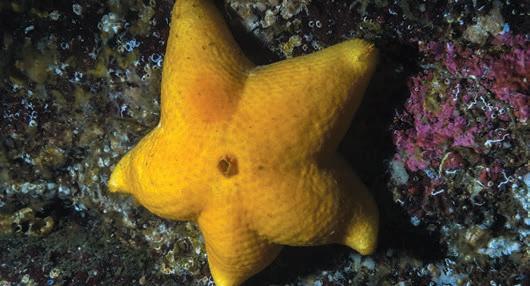
Biologists have discovered more than 5,000 new species of marine life in the Clarion-Clipperton Zone (CCZ), an untouched seabed in the Pacific Ocean spanning nearly 2 million square miles between Hawaii and Mexico. Remarkably, approximately 90 percent of the species are entirely new to science. In a paper published in the journal Current Biology, scientists provided the first list of CCZ species, although most of them have not yet been named or described. The checklist focuses on multicellular animals dwelling on the ocean floor.
This research is crucial for assessing the potential consequences of deep-sea mining in the CCZ. The seafloor is rich with cobalt, manganese, nickel, copper and zinc—minerals that are critical for renewable energy technologies. Already, 31 exploration contracts have been awarded to several mining companies. Excavation in the CCZ has not yet begun, and scientists, activists and governments have urged caution until researchers are able to evaluate and better understand the impact that mining would have on this unique marine ecosystem.
The Dead Sea is one of the most unique bodies of water in the world. It is the lowest spot on Earth and home to rich, therapeutic minerals. However, each year, its water level drops about four feet, causing the lake to recede and the surrounding landscape to change dramatically. As the water continues to dry up, beautiful, yet eerie, salt formations are left at the shore. These salt deposits create huge sinkholes that swallow up beaches, parking lots, and basil and watermelon farms surrounding the lake. While climate change seems to be exacerbating the receding water, the progressive decline of the Dead Sea
is primarily caused by another manmade issue. Fresh water that used to flow from the Sea of Galilee and the Jordan River into the Dead Sea is being diverted for drinking water and irrigation in Israel, Jordan and Syria. Additionally, Israeli and Jordanian companies consistently evaporate Dead Sea water to harvest its minerals. Potential solutions to save this world beauty include building a canal from the Red Sea and boosting the Jordan River’s flow into the Dead Sea. A lack of significant action to desalinate the lake may lead to the loss of this historical site.
According to the U.S. Environmental Protection Agency, indoor air pollution can be as high as, or even higher than, outdoor levels. Because we spend about 90 percent of our time indoors, ambient air quality can impact anyone’s health, but seniors, children and people with health conditions like asthma and heart disease are more vulnerable. Some pollutants come from outside; others originate indoors through cooking, cleaning, smoking, building materials, consumer products and furnishings. Common contaminants include formaldehyde, mold and pollen. Consider these measures to maintain a healthy, fresh-air environment inside the dwelling.
Open non-street-facing windows for 15 minutes every day to let fresh air in. Even if it’s colder or hotter outdoors, indoor air quality will improve, and the temperature will adjust quickly. The best times to ventilate are before 10 a.m. and after 9 p.m., when outdoor pollution is lowest. Air quality alerts for particulates from forest fires or heavy smog may indicate skipping ventilation. To expel pollutants,
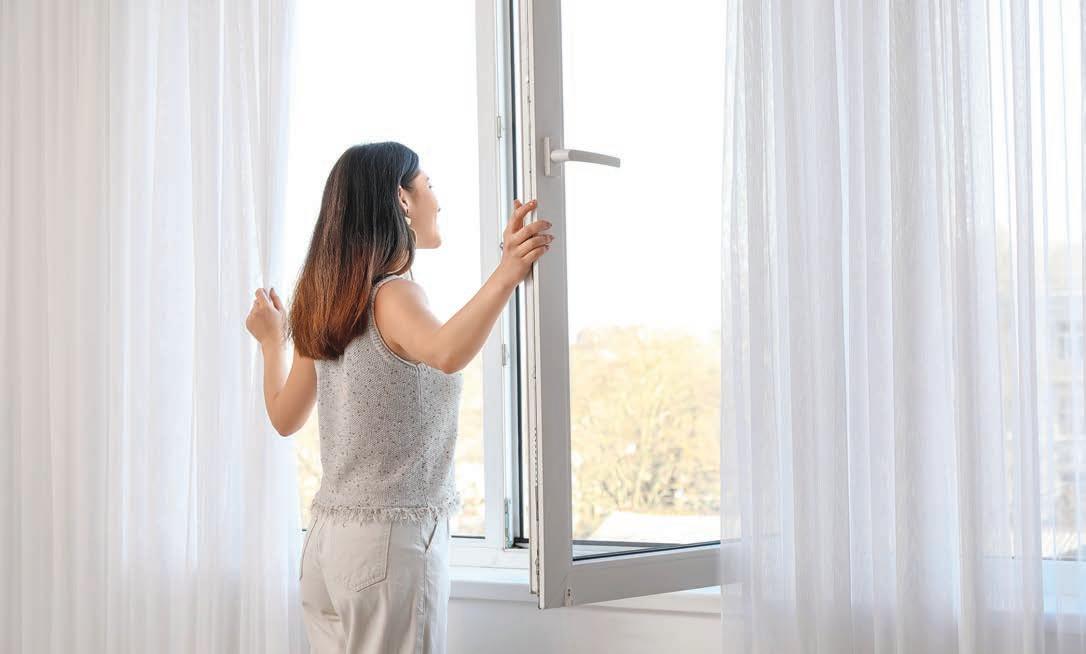
use bathroom and kitchen exhaust fans, or position a fan to blow out of a window. Ventilate rooms when painting or engaging in maintenance and hobbies that use noxious chemicals.
High-efficiency particulate air (HEPA) filters fitted into heating, ventilation and air-conditioning systems remove pollutants throughout the house, including dust, pollen, mold and bacteria. Portable air cleaners known as HEPA air purifiers can sanitize a single room or area. For more information, visit Tinyurl.com/EPAindoorair.
To reduce airborne, allergy-causing agents, including dust mites, pollen, animal dander and dust (comprised of dead skin, soil, fungal spores and chemicals), houseclean regularly. Use a vacuum with HEPA filtration and strong suction. Wet-wipe and wet-mop surfaces with reusable, compostable materials like washable cotton, hemp or wool. Avoid petroleumbased microfiber, which releases microplastics. Mops with bamboo or metal handles are more eco-friendly and longer lasting than plastic types.
Remove shoes at the door to prevent tracking in pesticides from green spaces and infectious bacteria from public restrooms, healthcare buildings or foodservice facilities.
Replace chemical-ridden air fresheners, body perfumes and bug sprays with low-toxicity, DIY or commercial products that use essential oils and plant-based ingredients. Choose cleaning products certified or recommended by Green Seal (GreenSeal.org), EcoLogo (EcoLogo.org) or the EWG Guide to Healthy Cleaning (Tinyurl.com/EWGclean).
Make sure new furnishings and remodeling materials don’t contain lead, asbestos, flame retardants, volatile organic compounds or perfluorinated chemicals. Choose Forest Stewardship Council-certified wood furniture and Global Organic Textile Standard-certified textiles. For more tips, visit Tinyurl.com/EWGhomeguide




It’s never too late to take an evening drawing class at the local high school, learn a language with the help of an app or get one-on-one tutoring from a piano instructor. Adults of any age can find personal and professional benefits when they engage in what is termed “lifelong learning”. It is a great way to spice up retirement, acquire skills for a coveted promotion, master new technology, express creativity or simply keep the mind sharp.
Lifelong learners are generally curious, self-motivated and passionate individuals. Their continuing educational pursuits can lead to mental and emotional benefits, including healthier, more fulfilling lives.


In a study published in the journal Psychological Science involving 200 seniors, neuroscientists at the Center for Vital Longevity at The University of Texas at Dallas found that sustained engagement in cognitively demanding, novel activities—such as learning digital photography or quilting—significantly enhanced memory function in older adults. The researchers were surprised to discover that the control group, which engaged in fun, social activities without learning a new skill, did not perform as well in memory tests.
In a report published in the journal Neurology, Dr. Keith Johnson from Massachusetts General Hospital and Harvard Medical School found that people engaged in higher levels of intellectual stimulation throughout their lives can delay the onset of memory problems and other symptoms of Alzheimer’s disease, although it does not represent a cure for the illness.
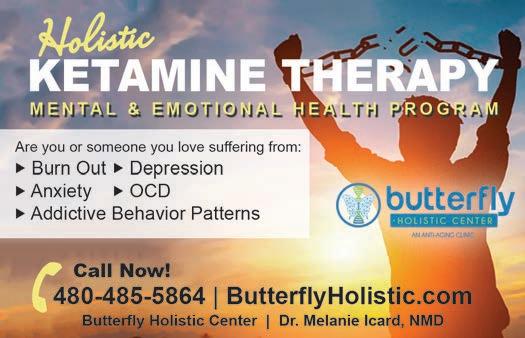
The mind is a use-it-or-lose-it tool, says Dr. Lise Van Susteren, a general and forensic psychiatrist in Washington, D.C. “What better way to use our short-term and long-term memory than to engage in lifelong learning? The older we get, the less likely we are to exercise short-term memory. We program our phones with numbers we call regularly. We store passwords and usernames in our computers and never attempt to memorize credit card numbers,” she explains. “We’re not using our brains enough, leaving us open to being replaced by AI [artificial intelligence]. The brain is a muscle to be exercised regularly or like a car that you must keep tuned up.”

Susteren points to a five-year study of London taxi drivers, which found that the hippocampus, a part of the brain that is crucial for long-term memory and spatial navigation, was larger than average in the brains of these cabbies. What’s more, the neuroscientists at University College London were able to show through magnetic resonance imaging that this gray-matter growth occurred over a four-year period after the drivers had memorized an intricate network of 25,000 streets and thousands of routes to tourist attractions and city hotspots. According to Van Susteren, this study suggests that intensive learning can spur the brain to grow over time.
Ingrid Bianca Byerly, director of the Humanitarian Challenges Focus Program and senior lecturing fellow in the Thompson Writing Program, at Duke University, describes lifelong learners as audacious, curious and fun-loving people that passionately seize the day. In a TEDxStGeorge talk entitled “The New Fountain of Youth: Lifelong Learning”, she recounts the invigorating experience of being on the faculty of three Semester at Sea voyages, where she taught undergraduate students and lifelong
A study of London taxi drivers suggests that intensive learning can spur the brain to grow over time.
learners world music and public-speaking advocacy for global humanitarian causes.
“Entering college, you’re asking yourself, ‘What am I going to do for a job and a paycheck?’ and at retirement, you’re asking, ‘What is my purpose, and what am I going to do with the rest of my life for my personal fulfillment and enrichment?’” Byerly expresses admiration for lifelong learners that pursue life goals, learn to play musical instruments, take art classes, climb mountains or write memoirs, and surmises that the secret to staying young and keeping the mind alive is adult education.
For some lifelong learners, seeking new opportunities and embracing change are compelling motivators. Take Maia Toll, for example. In 2006, she followed a whim to study herbalism with a traditional healer in Ireland. For the elementary school teacher living in Beacon, New York, botanical herbs had only been a hobby up to that point.

“Apprenticing with Eleanor changed everything,” she says of her experience with her Irish-based mentor. “I had the space in my life and money from selling my house. Three months turned into nearly a year, and upon returning home, I continued studying for four more years.”

Toll left her teaching career to become a full-time herbalist and is now the co-owner of a shop called Herbiary, with locations in Philadelphia, Pennsylvania, and Asheville, North Carolina, where she lives. She has taught herbalism at West Chester University in their School of Public Health, led a study program in the Amazon rainforest and written several books, including her latest, Letting Magic In. As she explains, “Lifelong learning can change your life at any age.”

For 30 years, Jim Walker was a labor representative for the California School Employees Association. He recalls teaching a labor-law class as an adjunct instructor for Los Angeles Trade-Technical College and estimates that about 80 percent of his students were lifelong learners, which he defines as adults between the ages of 30 and 45 that are interested in the subject matter for personal or professional reasons rather than satisfying a requirement for a college degree.
“It was obvious to me that these lifelong learners were more dedicated students than college students. They were like sponges and wanted to absorb everything. Occasionally during classes, it was the lifelong learners that were on their phones googling the subject and updating my facts,” says Walker, who admits that when he had more free time in retirement, he enrolled in meteorology and astrology courses to satisfy longstanding interests of his own.
In love with learning and the sense of accomplishment she feels whenever she masters a subject, Doreen DeStefano, of Root Causes
Holistic Health & Medicine, in Fort Myers, Florida, has been earning degrees since 1987. She holds bachelor’s degrees in nursing and exercise physiology, master’s degrees in criminology and public business administration, and doctorates in natural health and nursing practice. “In medicine, there is always something new to learn,” she says. “I think that’s why I chose this field. It’s fun to learn the latest thing.”
There are numerous opportunities for learning, in person and online.


n For people that work full time, many cities offer evening classes at high schools, colleges or civic centers on a wide range of subjects.
n Museums and art institutions commonly host demonstrations and in-depth instruction by local artists.
n A neighborhood music store can lead to connections with musicians that tutor burgeoning rock stars.
n For those harboring thespian aspirations, a hometown improv group or regional theater may be holding auditions or offering acting classes.
n Dance studios help people step up their ballroom dance skills.
n Contact a chef or visit a kitchen supply store for cooking lessons.
n A nearby botanical garden or gardening shop may offer how-to classes for growing native or pollinator plants.
n Pick up sewing tips at the fabric store.
n If a class is not offered, create a study group that meets at a cafe or park to learn together.
n To become proficient in a new language, check out apps like RosettaStone.com and Duolingo.com
n YouTube.com is an endless source for instructional videos of every variety.
n Visit Ted.com for informative and inspiring TED talks by global experts in their respective fields.
n For students that wish to learn while taking nature walks, a vast world of podcasts awaits.
n For transformational learning, try MindValley.com, UbiquityUniversity.org and Gaia.org.
n Coursera.org offers many streaming courses, documentaries and films.
n Auditing university classes at prestigious, world-class schools is just a click away. Visit these popular sites, many of which offer courses for free: Harvard University (pll.harvard.edu/catalog/ free), Stanford University (Online.Stanford.edu/free-courses), EdX (EdX.org) and The Open University (Open.edu).
Linda Sechrist has been a contributing writer to Natural Awakenings publications for 20 years.

www.EckankarArizona.org
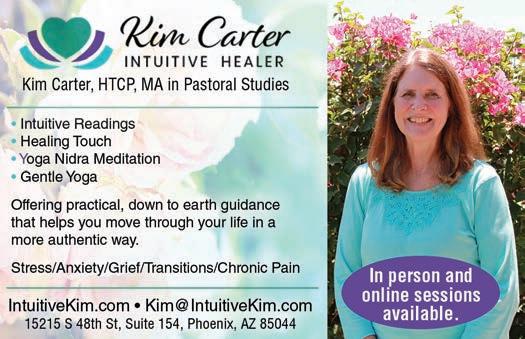

It’s back-to-school season, and for students with food issues, meal planning is as important as lining up classroom supplies and extracurricular schedules. Paramount in their minds is to avoid ingredients that might cause unappealing reactions or compromise health, while not stressing about the risks or feeling cheated that they cannot eat the same things as their friends.
Often, food allergies, sensitivities and intolerances are incorrectly used interchangeably when, in fact, the symptoms, treatments and safety recommendations differ. Consult a physician for a proper diagnosis and a nutritionist for dietary guidance.
FOOD ALLERGIES cause an almost immediate, potentially deadly immune response (anaphylaxis) requiring an epinephrine shot. Symptoms include a drop in blood pressure, narrowing of the airways, rashes, nausea and vomiting. The U.S. Centers for Disease Control and Prevention (CDC) estimates that 20 percent of students with food allergies will have a reaction at school. Eight ingredients account for 90 percent of food allergies: milk, eggs, fish, shellfish, tree nuts, peanuts, wheat and soybeans.
FOOD INTOLERANCES result from an inability to digest certain foods due to an enzyme deficiency or irritable bowel syndrome. The most common forms of intolerance are caused by lactose, histamine and gluten.
FOOD SENSITIVITIES provoke delayed symptoms (sometimes days after eating a problematic ingredient), including diarrhea, rashes, joint pain, digestive problems, fatigue and brain fog. Among children, common triggers are lactose, gluten, grains, legumes, soy, corn and yeast.
According to Karen Raden, an Illinoisbased registered dietician and certified clinical nutritionist, the goal is what she calls “food freedom”: the empowerment of students to make informed choices that feel best for them and their bodies. “Even if a child’s options are limited, it’s important to allow them to make substitutions. The less restricted, the better. It’s not just about the science; there’s a lot of emotion that goes into it, too,” she says.
Dr. Dawn Huebner, a psychologist, author and parent coach in Sacramento, California, says, “There is danger associated with allergies, and anxiety results when you overestimate the danger. In children, this can morph into anxiety about eating with other people or touching things in the classroom. Many parents are intent on making uncomfortable feelings go away, so they end up minimizing feelings, telling their children to simply not worry.”
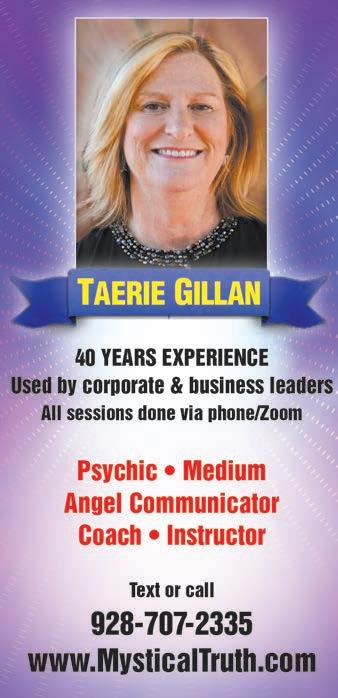
A better approach, Huebner says, is to acknowledge the child’s reality and empathize with them. “Say to your child in a really direct way, ‘Yes, that’s hard to see your friends eating ice cream or cupcakes that you don’t get to have.’ Even though there are food substitutions, it doesn’t make up for the fact that a student doesn’t get to be a regular kid, eating what everyone else gets to eat.”

Huebner suggests that parents help their children develop skills to overcome temptation, rather than berating or punishing them for occasionally sneaking forbidden foods. At all times, delicious alternatives should be readily available.
Theresa Diulus, a Texas-based nutrition coach, believes in empowering kids by keeping ready-made foods in clearly marked bins that kids can easily access. She stocks the pantry with gluten-free oatmeal
and coconut or cassava flour cake mixes, and stores frozen, gluten-free waffle or pancake batter in batches to save time when a safe and delicious treat is needed.
Replacing essential nutrients that might be missing once certain foods are eliminated is another key objective. “If dairy is the problem, for example, we worry about bone health and need to make sure the child is getting calcium from nondairy sources,” Raden explains. “I like to find out what their favorite foods are and modify them. Food issues are more prevalent these days. We’re really lucky now that there are very good substitutes for eggs, dairy and gluten.”
Raden recently adapted a shepherd’s pie recipe by using gluten-free flour and almond milk. For people that cannot tolerate regular eggs, she recommends using a “flax egg” in baked goods, which combines one tablespoon of flaxseed meal with three tablespoons of water.
When they were little, Caroline Somers’ two daughters developed extensive food intolerances and food allergies with inflammation, gastrointestinal bloating and digestive distress. Tasked with reimagining her family’s diet, the president of Suzanne Somers Companies created new versions of her favorite recipes, which will be featured in her upcoming cookbook, Served: From My Family Table to Yours.
“Many people deal with family members who have food preferences or intolerances to foods, and it can turn the person preparing foods into a short-order cook— no gluten for this one; vegan for that one; this one will eat fish but no dairy. It can make your head spin,” says Somers. Her Vietnamese Spring Rolls recipe addresses this predicament by serving the ingredients family-style and inviting each person at the table to assemble their own spring roll according to their food preferences and restrictions.
To accommodate a family with differing dietary needs due to food allergies, sensitivities or intolerances, this dish is served family-style, allowing diners to assemble their own spring rolls, choosing from the ingredients that fit their food restrictions.
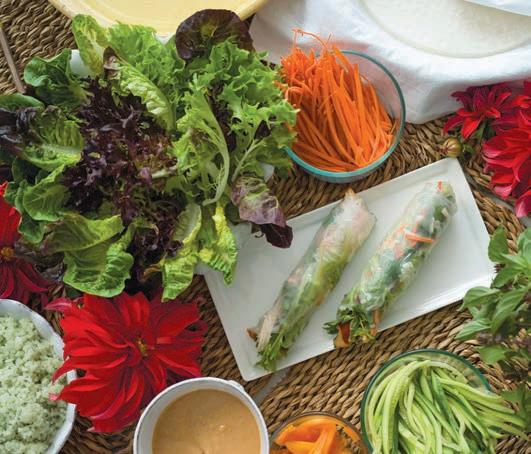
YIELD: 24 SPRING ROLLS (6 ENTREE SERVINGS, 10 APPETIZER SERVINGS)
1 8-oz package of 8¾-inch rice spring roll wrappers (24 wrappers)
1 bunch Thai basil (or Italian basil), leaves only
1 bunch fresh mint, leaves only
1 bunch fresh cilantro, leaves only
3 cups coconut jade pearl rice (recipe below)
2 mangoes or papayas, pitted, peeled and sliced into long, thin strips
4 Persian cucumbers, julienned into long, thin strips
6 carrots, julienned into long, thin strips
¼ cup crispy ginger (recipe below)
1 head romaine lettuce, thinly sliced
1 head red leaf lettuce, thinly sliced
2 cups sesame ginger vinaigrette (recipe below)
1 cup peanut sauce (recipe below)
Sriracha to taste
1 15-oz bag (2¼ cups) Lotus Foods Jade Pearl Rice (or jasmine rice)
1 14-oz can unsweetened coconut milk
1¼ cups water
Pinch of sea salt
Do not rinse the rice. Combine rice, coconut milk, water and salt in a pot and bring to a boil. Cover, reduce the heat to a simmer and cook for 20 minutes. Remove from the heat and let stand for 10 minutes. Fluff with a fork and serve. Can also be prepared in a rice cooker with the same ratios.
CRISPY GINGER
1 palm-sized piece of fresh ginger
½ cup toasted sesame oil
Peel the ginger and thinly dice it. Heat the oil in a sauté pan over medium-high heat. Add the diced ginger and fry until golden brown— approximately 6 to 8 minutes—stirring frequently to brown evenly. Transfer the crispy ginger to a small serving bowl with a tiny spoon.
1 cup toasted sesame oil
¾ cup rice wine vinegar
¼ cup tamari (or soy sauce)
2 Tbsp grated fresh ginger
1 Tbsp dried hot mustard
Combine all the ingredients in a jar with fitted lid. Cover and shake until well combined. Store in the refrigerator for up to 2 months
PEANUT SAUCE
½ cup creamy peanut butter
1 Tbsp grated fresh ginger
2 cloves garlic, pressed
2 Tbsp palm sugar
2 Tbsp sweet chili sauce
1 lime, juiced
1 Tbsp rice wine vinegar
1 Tbsp tamari (or soy sauce)
1 Tbsp toasted sesame oil
2 to 3 Tbsp warm water
Heat the peanut butter in a medium bowl in the microwave for 20 to 30 seconds. Add the ginger, garlic, sugar, chili sauce, lime juice, vinegar, tamari and sesame oil, and whisk to combine. Add the warm water to thin the sauce to desired consistency. Store in a covered jar in the refrigerator for up to 2 months.
To assemble a spring roll, dip one rice wrapper completely in a shallow bowl of warm water for about 5 seconds. Remove and spread flat on a plate or chopping board. Place basil leaves down the center. Continue to top the single strip with mint, cilantro, a thin layer of rice, mango, cucumber, carrot, a few pieces of crispy ginger and lettuce. Do not overstuff.
Fold up the bottom first, then fold over one side of the wrapper, tucking and rolling the filling into a compact cylinder, leaving the top end open. Serve the rolls with bowls of sesame ginger vinaigrette, peanut sauce and sriracha. Repeat to make desired number of rolls, using any combination of ingredients.
Recipe and photo courtesy of Caroline Somers.

YIELD: 4 SERVINGS
BURGERS
1 lb ground turkey
¼ tsp onion powder
¼ tsp garlic powder
¼ tsp paprika
1 tsp salt
1 Tbsp avocado oil
SWEET POTATO “BUNS”
1 large sweet potato, peeled and sliced into ⅓-inch slices
2 to 3 Tbsp avocado oil
In a medium bowl, combine ground turkey and spices until mixed well, but don’t over-mix. Wet hands and divide mixture into 8 equal portions, then form into patties. Pat down really flat, as they will plump up when they cook.
Heat a cast iron skillet or heavy cooking pan over medium heat, then add avocado oil and swirl pan to cover the bottom. Add the meat patties and cook until the internal temperature reaches 165º F, approximately 4 to 5 minutes on each side.
For the sweet potato buns, heat a cast iron skillet or a heavy cooking pan over medium heat, then add avocado oil and swirl the pan to cover the bottom. Add the sweet potato slices and cook until golden and tender but not mushy, about 3 to 5 minutes on each side.
To assemble the bento box, place two burgers in the largest compartment and add fresh veggies and fruits to the smaller compartments.
Recipe and photo courtesy of Theresa Diulus.
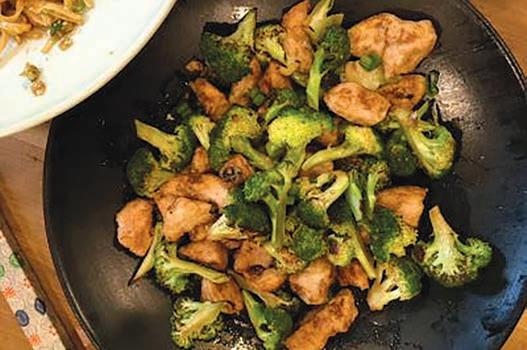
This recipe uses gluten-free tamari instead of soy sauce for the glaze and rice flour instead of gluten-containing white flour to lightly coat the chicken, helping to keep the meat juicy and tender.
YIELD: 4 SERVINGS
1 to 2 chicken breasts (depending on size), cut into 1-inch pieces
¼ cup rice flour
½ tsp salt
2 grinds of fresh pepper
3 Tbsp vegetable oil
1-inch section of ginger root, peeled and chopped
1 scallion, sliced
1 broccoli crown, chopped
ASIAN GLAZE
1 Tbsp gluten-free tamari
1 tsp rice wine vinegar
½ tsp toasted sesame oil
2 tsp honey
In a bowl, combine the rice flour with salt and pepper. Toss the chicken in the mixture and set aside. In a large, nonstick pan, heat 1 tablespoon oil on medium high heat and add the ginger and white part of the scallions, quickly stir frying for 1 minute. Add the broccoli and continue cooking until slightly tender. Remove from the pan to a platter.
Add the remaining 2 tablespoons of oil to the pan. Cook the chicken, stirring occasionally until lightly browned on all sides. Meanwhile, stir together the glaze ingredients in a small bowl. Once the chicken is cooked, add the glaze to the pan and cook for 1 minute to thicken it. Add the broccoli and remaining green parts of the scallions and combine to heat through. Serve over rice or noodles.
and photo
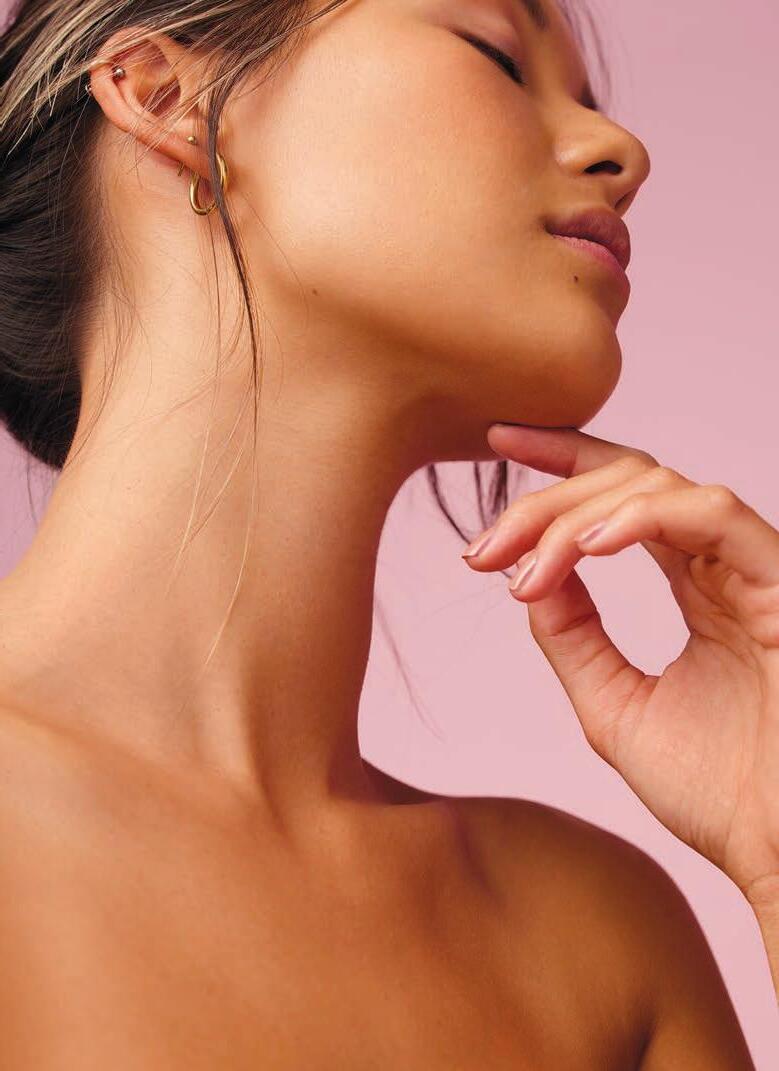 by Sheila Julson
by Sheila Julson
Whether it’s a wedding day or job interview, nothing puts a damper on the moment like an outbreak of acne. It can be embarrassing and compromise self-confidence, but natural treatments and lifestyle modifications can keep those breakouts at bay.
According to the American Academy of Dermatology Association, acne is the most common skin condition in the U.S., affecting up to 50 million Americans annually and roughly 85 percent of 12- to 24-year-olds. Dr. Julie Greenberg, a naturopathic doctor and founder of the Center for Integrative & Naturopathic Dermatology, in Los Angeles, notes that the prevalence of acne in this country leads people to wrongly conclude that it is a normal part of being human.
“In fact, studies of indigenous cultures throughout the world do not find any acne in their populations. Acne is a disease of the Western lifestyle,” she asserts.
In essence, acne is an inflammatory skin condition that causes pimples, blackheads, whiteheads and redness. It is prompted by the overproduction of sebum, an oil produced by the sebaceous glands to lubricate hair follicles. Symptoms can be aggravated by an overgrowth of bacteria or yeast, excess hormonal activity or stress.


“The pathways that trigger acne are the same pathways that trigger inflammation. If you’re having acne on the skin, that generally means there are moderate to high levels of inflammation in the body, so that should be addressed,” says Saya Obayan, a board-certified integrative dermatologist at Skin Joy Dermatology, in Austin, Texas. She recommends keeping a food journal for six weeks to identify inflammatory foods that noticeably trigger an acne response and eliminating them from the diet. Many of the culprits are part of the Standard American Diet, including animal protein, wheat and sugar—foods that can increase sebum production, and thus generate acne.
Dr. Steven Daveluy, associate professor and program director for the Wayne State University School of Dermatology, in Dearborn, Michigan, notes that dairy spurs acne, as well. “Dairy contains an amino acid called leucine, which stimulates oil production and affects the skin cells to cause clogged pores. It also influences the insulin pathway, which can affect hormones,” he explains.
According to the Cleveland Clinic, hormonal acne develops when hormonal changes increase the amount of oil the skin produces. This scenario is particularly noticeable in teens going through puberty and in both perimenopausal and menopausal women.
Greenberg approaches acne like she would any other inflammatory disease— by focusing on the gut microbiome. She recommends consuming at least 35 grams of fiber per day, eating a diverse array of fruits and vegetables, limiting meat consumption to four-ounce servings and eliminating or reducing alcohol, sugar and wheat to support microbiome health.
Obayan notes that stress aggravates any inflammatory disease, including acne. Meditation, exercise or regular walks can help calm the mind and lower stress. She also recommends herbs like ashwagandha to lower cortisol, a stress hormone that can trigger acne.
“The things we put on our skin can lead to clogged pores and trigger acne, including makeup and hair products. If you’re getting acne in places where your hair typically touches your face, it could be from a hair product transferring onto the skin,” Daveluy notes. He stresses that makeup should be washed off before bedtime. On the other hand, over-scrubbing or washing the face too often can dry out the skin, which also leads to clogged pores and acne.
“While acne should be addressed from the inside out, topical antibiotics can offer short-term relief and keep severe acne under control,” Obayan says. “Glycolic acid can help keep skin smooth and clear by exfoliating dead skin cells and unclogging pores. Tea tree oil has antibacterial and antimicrobial properties, but it shouldn’t be used undiluted on the skin; it can be overly irritating.”
In addition, Obayan recommends topicals like retinol, a nontoxic vitamin A derivative that can help reduce acne, hyperpigmentation, dark spots, scarring, fine lines and wrinkles. Bakuchiol, an extract from the babchi plant, along with topical green tea polyphenols, licorice extract and neem oil, can all be helpful to reduce acne.
Mom was right when she warned to leave pimples alone. “People often think that it’s helpful to manipulate your acne, but it can lead to more acne flaring, discoloration and even permanent scarring,” Daveluy advises. “Don’t believe anything on social media that isn’t posted by a board-certified dermatologist. The rest of the skin info on social media is junk and could lead to damage to your skin.”
People are by nature social creatures, and, according to the U.S. Centers for Disease Control and Prevention, human connection can lead to a longer life, better health and improved well-being. It should come as no surprise that for exercising, a group setting can also be a plus.
Led by a knowledgeable teacher and populated by likeminded participants, fitness classes offer a great way to jumpstart an exercise regimen and achieve fitness goals. Although some people may feel vulnerable when trying a new physical activity in front of strangers, there are ways to overcome the anxiety. Exercising together can transform a workout into a fun, motivating, socially fulfilling activity.

In most cities, an array of group fitness classes is available at gyms, YMCAs, community centers, medical facilities and other public and private venues. The diverse choices include Zumba, a Latin-inspired dance; barre, which incorporates ballet movements; spin cycling, or high-intensity stationary biking; many forms of yoga; the mind-body practice known as Pilates; and boot camp, a military-inspired workout that incorporates strength building with strenuous aerobics. Free group activities are often available, too, such as walking, running, dancing or hiking meetups.
Classes may be posted online and onsite. Scheduling apps can assist the search for nearby options, including ClassPass ( ClassPass.com ) and MindBody ( MindBodyOnline.com ) for classes and OneRoof (OneRoofApp.com) and Nextdoor (Nextdoor.com) for neighborhood meetups.
“Fitness classes are not one-size-fits-all, and finding an environment and a movement style that matches you can help you be more successful in your fitness journey,” says Jillian Aeder, a Denver-based doctor of physical therapy at Hinge Health and a certified athletic trainer. She recommends trying different studios and types of classes when starting out.
“Group classes are usually conducted on a weekly basis at the same time to help people find consistency in their workouts,” says Britney Kimball, a professional dancer and certified Pilates instructor for BK Movement Health, in New York City. “Attending
the same class every week not only helps you see the benefits of fitness faster, but also creates a comfortability with the instructor, the class and the people around you.”
Amber Grundy, a doctor of physical therapy and fitness instructor in Philadelphia, says, “Group fitness programs can be helpful in keeping you accountable for exercising on a regular basis. It makes you feel a part of a community, bringing together multiple fitness levels that can help challenge and motivate.”
Fitness classes offer the thrill of competition, Aeder says, noting, “I have seen firsthand how group settings help improve participation, performance and ultimately results.” Some classes encourage a healthy dose of competition by displaying scores, ranking attendees in speed or agility, or implementing tiers within an all-level class. In a 2011 study of older adults published in The International Journal of Sport and Society, researchers found that seniors like a challenge, enjoy “winning things” and are motivated to work harder when engaging in competition.
To alleviate anxiety about joining a new program, Kimball recommends that people show up to class early, introduce themselves and ask questions. “An instructor will love it when you’re involved, wanting to learn and openly communicating with them,” she explains.
Grundy suggests managing expectations. “Read the description of the class before attending to learn what to expect, and if
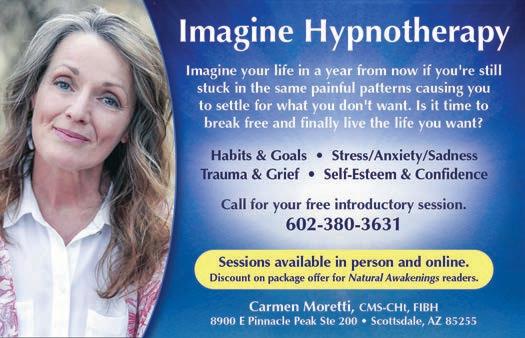
you’re worried about past injuries or limitations, review that with the instructor. Often, group classes will offer options based on difficulty level. It’s OK for a beginner to take an expert class so long as they take breaks throughout the workout.”
Group classes have one very important advantage over individual training: cost. According to the Aerobics and Fitness Association of America, a one-on-one personal training session may begin at $80, whereas a group class with 10 students could be $20 each. Lower costs make sustained attendance more achievable.
“The group setting is a nice way to both meet new people and spend extra time with friends or family,” says Grundy. “The camaraderie makes participants more accountable; many leave class saying, ‘See you next time!’ or asking, ‘Where have you been?’”
Kimball has noticed her students walk out feeling better, looking more confident and going into the rest of their day in a better mood. She says, “Oftentimes we are our own biggest critic, but it is important to push past that to show up, move the body and have fun.”
Cristina Parker holds a doctorate in physical therapy. She is a researcher, health content writer, educator and clinician specializing in neurologic disorders, limb-loss rehabilitation and adaptive sports techniques.

 by Julie Peterson
by Julie Peterson
Blended families are complex and often challenging. A marriage between two people that already have children creates new relationships with individuals that were strangers not long ago. The newlyweds must nurture their own kids while forming new bonds with stepchildren, and the children may need to figure out how to accept a stepparent into their lives, share physical and emotional space with stepsiblings or spend part of their time in their other parent’s home.
It’s a lot to ask. Imagine this through the eyes of a young child or teenager. It might be confusing, frustrating or infuriating. Fortunately, there are methods to knit a blended family into a strong and enduring tapestry.
According to Julee Peterson, a Californiabased therapist at Helping Blended Families, 65 percent of families are blended. It is the new norm. And yet, the U.S. Centers for Disease Control and Prevention estimates that 23 percent of second marriages end in divorce after five years and 39 percent dissolve after 10 years. Peterson notes, “Many reputable scholars still project the overall divorce rate for all marriages to be between 40 and 50 percent.”
To avoid becoming part of these statistics, it is crucial to manage expectations before creating a blended family. “What roles do you see each other playing? How are you going to handle discipline, experience holidays, safeguard your relationship or deal with divorce drama?” asks Christina McGhee, MSW, author of Parenting Apart: How Separated and Divorced Parents Can Raise Happy and Secure Kids.
McGhee, who prefers to be called “bonus mom” by her two stepchildren, cautions parents not to underestimate the amount of stress that blended families experience due to different parenting styles, uncooperative coparents and revolving schedules. “But it’s still possible to create an environment where everybody feels connected and accepted,” she asserts.
“Even very young children pick up on body language and stress,” says McGhee. “Kids can do remarkably well having one household that is grounded, balanced and supportive with parental figures that validate their feelings, shield them from conflict, create opportunities for conversation and remain consistent and predictable.”
While it’s OK if a stepchild is not comfortable with a stepparent right away, “the child should have an understanding of the importance of the stepparent in their life, and that the stepparent should be treated

with respect,” says attorney Victoria Kelly, a partner at Sefton Kelly Family Law, in Naperville, Illinois.
Although a couple may be excited to embark upon a blended-family adventure, their children may feel pressured into instantly liking or accepting a stepparent.
“Kids may feel a loyalty conflict or worry about betraying the other parent if they accept the stepparent,” says McGhee, suggesting that stepparents encourage and support one-on-one time with the other parent.
“It’s critical for bonus parents to honor the history that your bonus children have,” she advises. “Part of their lives didn’t include you. Respect that.”
“You have zero control over the decisions that coparents make—what they do, what they say, the rules that they establish,” says McGhee. “But you always have a choice about how you respond and how you engage. Focus on what you can control.”
“It’s important to have an open line of communication with the other parent, but if the other parent is not comfortable speaking with the stepparent, that boundary should be respected," advises Kelly. “All families can benefit from monthly meetings.”
“Often, there are issues that kids are navigating behind the scenes that don’t make it on our parent radar,” McGhee notes,
suggesting that parents set up a transition time when children are moving between households, such as a gathering around the dinner table to talk about the things that took place while apart. “Kids need some emotional space to shift gears,” she says. “When they’re with the other parent, keep communication open, so that when the children come back through the door, they don’t get sensory overload.”
Will Smith, senior business development manager for Acrow Bridge, in Alabama, raised one biological son and one stepson. He says that each child is different, so every situation needs to be customized to meet their needs. Smith and his wife presented a clear and consistent front when setting long-term values and goals for the kids— expecting the boys to do well in school and go to college—and they leaned in hard to achieve those objectives.
Stepparents can gradually incorporate quality togetherness by celebrating holidays, new rituals or even ordinary activities. “My relationship with my stepson grew through a shared interest in sports,” Smith says. “As a family, we played a lot of board games and had some favorite movies. These things became traditions.”
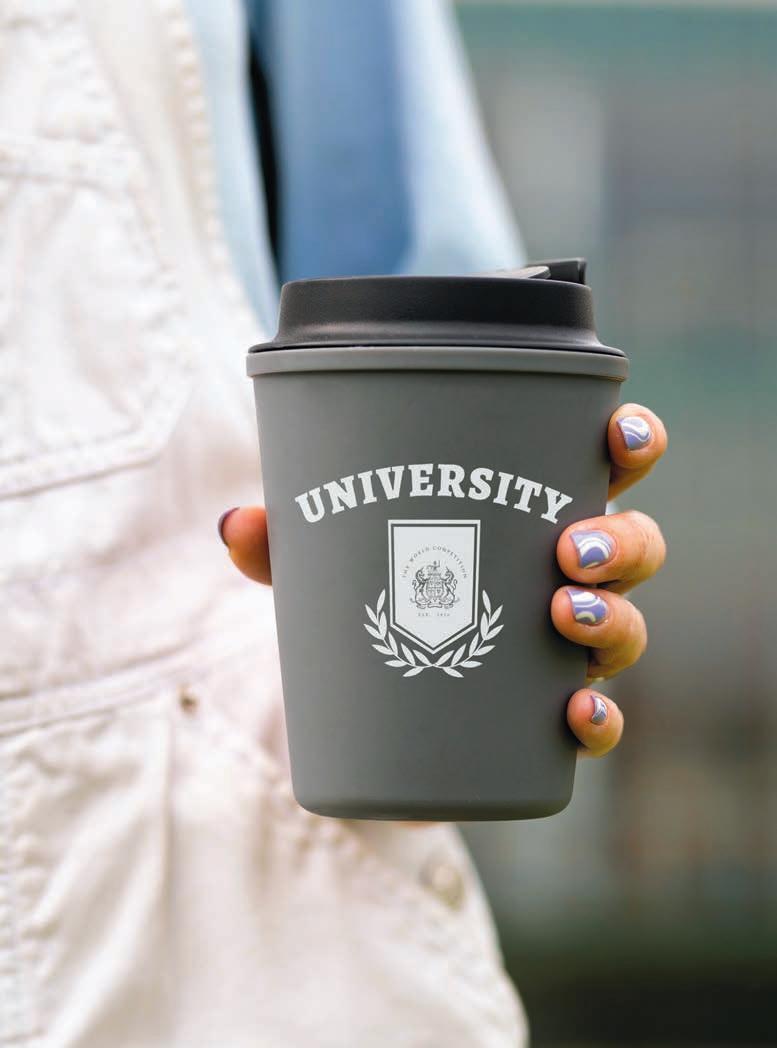 by Carrie Jackson
by Carrie Jackson
The halls of higher education are adopting more sustainable practices as students and university stakeholders increasingly understand that their lifestyle choices and daily operations impact the planet. Motivated by the climate crisis and global-warming-related disasters, many students are looking for ways to lower their individual carbon footprint. Schools, too, are implementing Earth-friendly initiatives throughout their campuses while also prioritizing climate-conscious subjects in their curriculums.
According to Julian Dautremont, director of programs at the Association for the Advancement of Sustainability in Higher Education (AASHE), “Sustainability education helps attract, retain and motivate top students and prepares them for responsible citizenship. It catalyzes increased giving and new funding sources, strengthens community relations and facilitates new partnerships. Moreover, sustainability research and education demonstrate relevance in addressing grand challenges and help unify the campus around a shared sense of purpose.”
AASHE advocates comprehensive modifications that make going green easy and second nature. “We recommend that institutions create systems in which sustainability is the default. Long-term measures such as installing low-flow fixtures in bathrooms, using induction stovetops in dorms and having light sensors that turn off automatically in offices make saving energy automatic,” Dautremont explains. “Where individual behavior is a factor, make the more sustainable choices convenient by, for example, providing water bottle filling stations on every floor, installing covered bike parking
and storage, or giving each room its own recycling receptacle and providing education and training to make sustainability behaviors the cultural norm.”
Sophomore Anna Ries-Roncalli, an environmental science major at Loyola University, in Chicago, says, “College is often the first time you’re learning how to be an adult and interacting with the world, and it’s important to make sure that your role is sustainable. Colleges have an inherent, built-in sense of community, and prioritizing sustainability comes more naturally when you see that it’s a collective responsibility that impacts others.”
Ries-Roncalli is aware of the impact her food choices have on the environment. “In our country, where we can buy anything we want from the grocery store, we are so disconnected from the food system. Most people don’t see a carton of eggs and think about every step that it took to get it on the shelves or where the farm it came from is located,” she says. To do her part, she brings reusable plates and utensils to the dining hall, takes leftovers home in a multi-use canister and shops locally or at farmers markets whenever possible. While Loyola composts most food waste in the dining halls, Ries-Roncalli volunteers with Food Recovery Network, a student organization that collects and distributes leftovers to local shelters and food pantries.
Michael Hughey, a senior in the environmental studies program at Loyola, takes full advantage of a partnership between the Chicago Transit Authority and Loyola that grants eligible students unlimited use of public trains and buses. “Students can also walk, take their own bike or use a bike share to get around. Not only are they cutting back on their carbon footprint, they’re engaging more with the city on a ground level,” Hughey explains. “We’ve seen the effects of climate change disproportionately affect low-income communities and communities of color. I personally want to mitigate those effects as much as possible and be kind to the planet and my neighbors.”
Cria Kay, program administrator at Northwestern University’s sustainNU, says, “I recommend finding something that brings you joy, identifying what changes you want to see in your life or community, then developing an action you can take
that applies your passion to the environmental issue you identified. Even something as simple as taking a walk to pause and notice the wildlife, water, air and soil around you can be helpful for well-being and getting inspired to take on more sustainable behaviors.”

Amy Spark, the sustainability coordinator at Bow Valley College, in Calgary, Canada, believes that sustainability literacy eventually will be required across all disciplines. “Students in every sector are going to be impacted by climate change. Nurses in our LPN [licensed practical nursing] program are seeing a spike in hospital visits with health issues from increasingly poor air quality. It is important to train future graduates to recognize and deal with the impacts of climate change in their disciplines,” she explains.
Spark encourages students to use their voices. “Human stories move decision-
makers, and schools are invested in their students’ overall experience. You don’t need to be an expert, but speak from your experience,” she suggests. “Tell your administrators and policymakers how air quality affects you, or let them know how having more bike lanes would help. If you see something, say something. Report leaky faucets, lights that won’t turn off and other inefficiencies to the maintenance department so proper repairs can be made.”
“Individual behavior change is important, but the single most powerful thing students can do is to advocate for broader change,” says Dautremont. “Students can be enormously influential in campus decisionmaking, and the impact of such changes generally is going to far outweigh the impact of individual behavior changes.”
There’s something meditative about observing the movement of colorful fish among swaying aquatic plants while hearing the soothing sounds of water. In our culture, where stress has run amok, the restorative ambiance created by a well-placed and properly designed aquarium may be a welcome remedy for the busyness of life.
A study by the U.S. National Institutes of Health reports that aquariums help lower blood pressure, reduce the risk of cardiovascular disease, lessen feelings of loneliness and serve as emotional support during mental health crises. Gazing at fish for just a few minutes every day can reduce stress, improve sleep and instill an overall sense of calm.
People have kept fish for more than 4,500 years, and since the late 1800s, the idea of marine life as pets has emerged as a popular pastime. Large public aquariums with multimillion-gallon exhibits thrill visitors around the globe, while smaller fish tanks adorn doctors’ offices, health spas, libraries and a myriad of public and professional spaces. With a little planning, the beauty and calming influence of these underwater displays can be incorporated into the home, offering a unique way to bring nature indoors, spark curiosity and teach kids valuable lessons.
Dr. Ran D. Anbar, a board-certified pediatric pulmonologist and pediatrician, has two aquariums in his waiting room in La Jolla, California. “Watching fish doesn’t require a lot of thought, and this allows the mind to settle down. It’s generally calming because the viewer’s interest is captured by the fishes’ unique appearances and smooth, rhythmic and repetitive navigation through water. Aquariums have been associated with improvement of mood, better pain management and blood sugar control,” says Anbar, who also offers hypnosis and counseling services to his patients.
If a child shows interest, Anbar incorporates the aquarium into his counseling
sessions. “I thank them for being kind to my fish, and this helps reduce tension. Kids love feeding the fish and watching them happily eat. We talk about how the fish might feel, which helps the kids describe their own thoughts and feelings. Sometimes, when children describe a fish’s response, they are able to verbalize thoughts they cannot say about themselves,” he explains. “Children also like to photograph or draw the fish, and I ask them to imagine the fish’s name, origin and hobbies. This sparks creativity, and they often become interested in setting up their own aquariums after seeing them in my office.”
Maintaining an aquarium can teach kids empathy and trustworthiness. “Children learn to be responsive to their fish’s needs, including how to observe the animals closely for signs of distress. Children learn to be patient and how to follow a schedule. They can learn to calm their own emotions in dealing with their fish, because otherwise

the pets might become agitated,” Anbar says, urging parents to supervise their kids closely until it is clear they are able to care for the animals responsibly.
Steven Waldron, the owner of Aquarium Zen, in Seattle, Washington, helps people create artistic installations inspired by the aquarist Takashi Amano, who combined Japanese gardening techniques with the wabi-sabi principle of finding beauty in imperfection. “Aquariums are living aquatic ecosystems, and it is deeply compelling to have a slice of that biome in your home,” Waldron says. “The very act of creating and maintaining that ecosystem taps into something instinctual and gives people structure, a sense of purpose and peace. With endless design possibilities, people are able to create a projection of their own aquatic paradise.”
To reap benefits, an aquarium need not be large or overly expensive. Waldron notes that a few green plants combined with colorful fish provide the right kinetic energy to be both soothing and invigorating. “Choose fish that complement the plants and are enjoyable to watch. Siamese fighting fish,
tetras, dwarf cichlids and dwarf shrimp are excellent for home aquariums. Some of these simply provide beauty and some, such as the Amano shrimp and the Otocinclus catfish, act as a cleanup crew and eat damaging algae,” he says. “Once it’s set up, routine maintenance, such as cleaning the tank and changing the water, should take less than an hour a week, and most people find caring for their aquarium to be a fulfilling and meditative task.”
While it may be tempting to put an aquarium in a bedroom, Waldron believes that can be too much energy for a space meant for slumber. “From a feng shui perspective, a dark corner of a common living space is the ideal location for an aquarium. This allows it to become the central focal point and provide light, life and positive energy,” he says. “Once you start to see natural energy flowing through the plants and animals, it becomes intuitive, and you see the connection to nature everywhere.”
This summer, join the largest holistic, conscious, spiritual and green network dating site online. We invite you to become a member and feel the energy on our site from the moment you first log in.


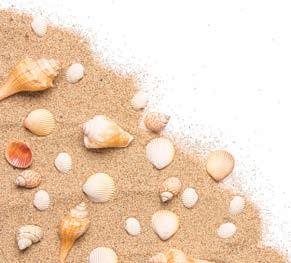




Scientists have discovered a natural way to kill germs fast.
They all said it worked, so he patented CopperZap® and put it on the market.
Soon hundreds of people had tried it. 99% said copper worked if they used it right away at the first sign of bad germs, like a tickle in the nose or a scratchy throat.
Soon people found other things they could use it against:
By Doug Cornell Colds and FluNow thousands of people are using it against viruses and bacteria that cause illness.
Colds, flu, and many other illnesses start when viruses get in your nose and multiply. If you don’t stop them early, they spread and cause misery.
Hundreds of studies confirm copper kills germs like viruses, bacteria, and fungus almost instantly, just by touch.
That’s why ancient Greeks and Egyptians used copper to purify water and heal wounds. They didn’t know about germs. Now we do.
The National Institutes of Health and the American Society for Microbiology vouch for the power of copper to kill germs.
Scientists say copper’s high conductance disrupts the electrical balance in a germ cell and destroys it in seconds.
The EPA recommends hospitals use copper for touch surfaces such as faucets and doorknobs. This cuts the spread of MRSA and other illnesses by over half, and saves lives.
The strong scientific evidence gave inventor Doug Cornell an idea. He
made a smooth copper probe with a tip to fit in the bottom of the nostril where viruses collect.
When he felt a tickle in his nose like a cold about to start, he rubbed the copper gently in his nose for 60 seconds.
“It worked!” he exclaimed. “The cold never happened.” That was 2012.
Now he’s gone 11 years without a cold. “I used to get 2-3 bad colds every year. Now I use my CopperZap right away at any sign I am about to get sick.”
After the initial success, he asked relatives and friends to try it.
Users say:
“It works! I love it!”
“I can’t believe how good my nose feels.”
“Is it supposed to work that fast?”
“One of the best presents ever.”
“Sixteen flights, not a sniffle!”
“Cold sores gone!”
“It saved me last holidays. The kids all got sick, but not me.”
“I am shocked! My sinus cleared, no more headache, no more congestion.”
“Best sleep I’ve had in years!”
Covid
Sinus trouble from germs
Cold sores or fever blisters
Canker sores that get infected
Mold allergies
Congestion or stuffiness
Drippy nose
Hay fever worsened by bacteria
Strep throat
Pink Eye and Styes
Skin infections
Infected sores
Cuts or wounds getting infected
Thrush and Tongue Infections
Warts
Ringworm
The handle is curved and textured to increase contact with fingers and hands in case you touch things sick people may have touched.

Scientists placed millions of viruses on copper. “The viruses started to die literally as soon as they touched it,” said Dr. Bill Keevil.
The EPA says copper works just as well when tarnished. Easy to clean or polish.
Made in America entirely of pure US copper. Comes with Directions. 90-day Money-back Guarantee. Price $79.95. Get $10 off each with code NATA36
See www.CopperZap.com or call toll-free 888-411-6114.
Buy once, use forever.
Statements not evaluated by the FDA. Not claimed to diagnose, treat, cure, or prevent any disease.
Before life snagged us in its insidious net of obligations, our child selves discovered awe around every bend. We poked our noses into fluffy, new dandelions and saw faces in passing clouds. “Why?” was a perpetual mantra we lived by, no doubt testing the patience of loved ones. Somewhere along the way, our eagerness to jump into the lap of the world and be held by magic gave way to a new way of being.
In 1942, Albert Einstein wrote to his old friend, German psychiatrist Otto Juliusburger, “People like you and I, though mortal of course like everyone else, do not grow old no matter how long we live. What I mean is we never cease to stand like curious children before the great Mystery into which we were born.” This quote reminds us to stop wading in the daily grind and dive into the deep end of everyday magic.
Discovering a new musical artist, learning about a country we never heard of and touching emerald moss during a Sunday hike wakes up the child in us, the self that is impervious to pessimism. Observing a flower at ground level with the bees or reacquainting ourselves with the changing wheel of constellations not only re-sparks our ability to respond to life but also reinforces our connection to the infinite.
Courting curiosity is the domain of cats, as well as the most contented humans. Rekindling our wonderment is even better when shared with kindred souls, and the ripple effect can travel further than we might expect. Here are some inspirations:
n Without a set plan, get in the car with a friend and see where the day takes you. Pack a picnic and stop for lunch somewhere off the beaten path.
n Regardless of artistic ability, begin a nature journal and record small bits of the seasons throughout the year.
n Check out a book or two from the children’s section at the library and be young again.
n Create a daily practice of daydreaming about something delightful that has nothing to do with the past or the future.

n Start a local meet-up with others that share a common passion: books, healthy baking, trains or thrifting.
n Revisit a childhood or teenage interest and don’t explain why.
Marlaina Donato is an author, painter and composer. Connect at JaguarFlower.art.
Connecting you to the leaders in natural health care and green living in our community. To find out how you can be included in the Business Directory, email PhoenixAds@NaturalAZ.com or visit NaturalAZ.com and download our media kit.
E-XPANSE INTEGRATIVE HEALING
RiAnn Holsonback, Wellness Energy Practitioner




2024 N 7th St, Ste 201, Phoenix 480-819-2299
e-xpanse.com
Begin your recovery for chronic health conditions with a Wellness Energy Practitioner and Psychic Healer. Clear the energetic root cause and restore life balance by addressing the body holistically through an energetic system of healing. Visit our website, and contact us for a free consultation and 20% off your initial service.
LEADING EDGE WELLNESS

MacKenzie Kalt, Owner/Director
4050 E Greenway Rd, Ste 5, Phoenix 480-594-5052 • NatPainTreat.com
Providing some of the most advanced natural technologies for those struggling with chronic pain, injuries, stress, migraine headaches, PTSD, insomnia, Lyme disease, autoimmune disorders, skin conditions, and much more. Visit our website to learn more. See ad, inside front cover and page 11.
NATURAL MEDICINE & DETOX
2701 N 7th St, Phoenix 602-307-0888
NaturalMedicineDetox.com
We offer a wide range of services that can help just about everyone at affordable prices. We also accept insurance for acupuncture, including Medicare. Please take a look at our website to learn about our services, gifted practitioners, and insurance information and form to see if your plan covers acupuncture. See ad, page 27.
PIHMA COLLEGE & CLINIC
Acupuncture, Herbal Medicine and Homeopathic Clinic
301 E Bethany Home Rd, Ste A-100, Phoenix 602-274-1885 • pihma.edu
PIHMA offers Acupuncture
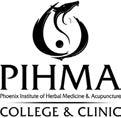
Treatments, Herbal Consultations, Acute and Constitutional Homeopathic Consultations, as well as Auricular Acupuncture, Cupping, Moxibustion, Gua Sha and Tui Na. Our medicines have been used for thousands of years to treat numerous conditions, including pain, stress and more. PIHMA is a teaching clinic and offers affordable pricing.
SW HERB SHOP & GATHERING PLACE
148 N Center St, Mesa 480-694-9931 • SWHerb.com Store.SWHerb.com
Kathy Gould and Madalyn Johnson, herbalists and proprietors, offer medicinal bulk herbs and specialty tea blends, herbal extracts, certification classes, community and therapist rental space, medicine-making supplies, and more. See ad, page 11.
WATERCOLOR ART CLASSES
Allura Westly
3611 E Sunnyside Dr, Phoenix AlluraWatercolor@cox.net 602-469-0524 • AlluraWaterColor.com
Allura Westly, master teacher, opens her sanctuary studio to all levels, beginner to advanced. Learn fluid color technique, drawing and composition. Small class of eight students. No talent required, just a desire to create.
MILLENNIUM DENTAL ASSOCIATES

5705 N Scottsdale Rd, Ste D-110, Scottsdale 480-948-0560
MillDental.com
Millennium Dental offers more than 50 years’ experience in holistic dentistry, including advanced general dentistry


Certified by the IABDM. See ad, page 9.
CALENDAR
Find and post events at NaturalAZ.com
Dr. Michael Margolis and Dr. Stephen Kovar
2045 S Vineyard Rd, Ste 153, Mesa 480-833-2232 • MyDentistAZ.com

A holistic and biological approach to your dental needs and overall health. Bio-compatible dentistry, esthetic dentistry lumineers/veneers, family dentistry and much more. See ad, page 3.
NATURAL DENTAL PARTNERS
3134 W Carefree Hwy, Ste 9, Phoenix 602-775-5120 • MyNaturalDentist.com
The doctors at Natural Dental Partners take the time to listen to your concerns and use their extensive experience to help you achieve better health. Using the latest technology (such as lowdose 3D imaging, CEREC, lasers, PRF, ozone and treatment of sleep disorders), they believe in a team approach to help you achieve your healthcare goals. Check out MyNaturalDentist. com or ABreathOfHealth.com to see how they can help you. See ad, pages 5 and 11.
BUTTERFLY HOLISTIC CENTER
Melanie Icard, NMD 1430 E Missouri Ave, Ste B127, Phoenix 602-353-7712 • ButterflyHolistic.com


Dr. Icard specializes in biological medicine, peptides, PRP, aesthetics and ozone therapy. Her offerings include holistic antiaging medicine, pain reversal, natural and traditional aesthetics, ozone therapy, holistic ketamine therapy, and sexual health regeneration. See ad, pages 17 and 21.

BLU DRAGON

Pat Duryea, PhD
6102 N 16th St, Ste 19, Phoenix
480-665-9781
PhxBluDragon.com
The Blu Room is patented technology, bringing ancient and future technologies of sound, light and sacred geometry together in the NOW. Clients relax on a therapeutic bed bathed in light and sound vibrations for 20 minutes. Clients report less stress, better sleep, better focus, and better health. Mention Natural Awakenings and receive a 25% discount.
KIM CARTER, MA, HTCP
15215 S 48th St, Ste 154, Phoenix Kim@IntuitiveKim.com
IntuitiveKim.com
Kim is an Intuitive and Healing Touch Certified Practitioner offering guidance when you feel out of alignment with your authentic self. Stress, fear, anxiety and grief/loss throw us off balance, making it challenging to access inner wisdom. Sessions include reading and clearing your energy field; and simple, practical self-healing tools to keep you balanced and grounded. See ad, page 19.
Taerie Gillan
928-707-2335
MysticalTruth.com
Psychic, medium, coaching and intuitive business advisory services. For 40 years, Taerie has helped people from all walks of life and around the world. As an Angel communicator, she works with the higher realms, offering empowerment, healing and peace from her sessions without compromising religious or spiritual beliefs. See ad, page 21.
931 E Southern Ave, Ste 106, Mesa 480-306-7321
RealignYourLifeAZ.com
Realign Your Life Wellness Center features the Harmonic Egg—sound and light therapy for physical, emotional and spiritual energy healing. Other services include The Body Code, Quantum Touch, sound baths and Higher Guidance Life Coaching. See ad, page 19.
IMAGINE HYPNOTHERAPY
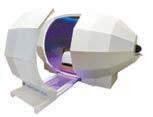
Carmen Moretti, CMS-CHt, FIBH 8900 E Pinnacle Peak, Ste 200, Scottsdale 602-380-3631
Over the past 13 years, Carmen Moretti has helped people access that power within themselves to break free and heal from patterns of sadness, stress and overwhelm and live a life that they are proud of and that they love. See ad, page 27.
NUTRITION REVIVED
Ute Haahr, Integrative Nutrition Coach 480-206-0752
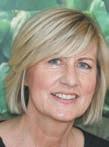
Ute@NutritionRevived.com

NutritionRevived.com
I help women with metabolic health issues balance their hormones, lose weight and reclaim their inner power. I specialize in helping women with involuntary childlessness through my integrative nutrition and mindset program. See ad, page 25.
ARIZONA ORGANIC PEST & TERMITE CONTROL

Organic Pest Control 602-923-1457 • ArizonaOrganic.com
Avoid being exposed to dangerous chemicals when all-natural and safer alternatives work just as well and last longer. See ad, page 17.
ANDREA BRIGGS, AKA “CRITTER DOC”
ASAM, Sh. Reiki, HTAP Communicator, Healer, Counselor 602-317-1543 • 1critterdoc@gmail.com SpiritAnimalWisdom.com
With a gentle healing touch, Andrea provides wellness counseling, energy healing, animal communication, and intuitive counsel for pets and their people.
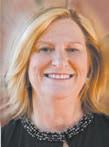

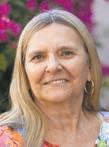
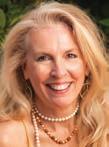


1538 E Southern Ave, Tempe 480-994-9244
Info@swiha.edu • swiha.edu
Nationally accredited college offers holistic health and wellness degrees, diplomas, certificates of excellence, continuing education and personal development, oncampus and online. Financial aid available. See ad, outside back cover.
11108 N Frank Lloyd Wright Blvd, Ste E16, Scottsdale 732-832-1036
DimensionsOfHeavenAndEarth.com
Dimensions of Heaven and Earth is Scottsdale’s exciting, new one-stop Spiritual Experience: a center of healing and insight combined with a store full of unique gifts from local artisans. With training and tools for your personal development, we are excited to help you take your spiritual journey to new levels! See ad, page 10.


The Path of Spiritual Freedom 1-877-300-4949 • EckankarArizona.org
Eckankar.org • HearHU.org
Facebook.com/EckankarArizona
Eckankar is an active, individual, creative spiritual practice. A companion and roadmap for your journey home—to the heights of SelfDiscovery and God-Discovery, and beyond. Come along and discover the most secret part of yourself. The key to spiritual freedom lies within you. Explore life as a Soul Adventure. See ad, page 19.
4105 N 20th St, Ste 115, Phoenix 480-442-5020
SummitLighthousePhoenix@gmail.com

SummitLighthousePhoenix.org
Dedicated to sharing Saint Germain’s Violet Flame. All faiths welcome. Learn how you can become a modern day mystic. We are dedicated to sharing the Teachings of the Ascended Masters® to help you bring in joy and peace to the world. Learn what the requirements are to make your ascension. See ad, page 25.
Sun City Farmers Market 16820 N 99th Ave
Thursdays Oct-May 9am-1pm
Facebook.com/Sun-City-Farmers-Market631299790224049


The Capitol Farmers Market
1700 Adams St, Phoenix
Thursdays 10:30am-1:30pm
ArizonaCommunityFarmersMarkets.com
Uptown Farmers Market
5757 N Central Ave, Phoenix
Wednesdays Oct-Apr 9am-1pm & May-Jun
8am-noon
Saturdays Nov-Apr 9am-1pm & May-Oct
8am-noon
UptownMarketAZ.com
Verrado Community Farmers Market



NOTE: Please check market websites and ArizonaCommunityFarmersMarkets.com for more information on days and hours, and any restrictions.

Ahwatukee Farmers Market
4700 E Warner Rd, Phoenix
Sundays Oct-May 9am-1pm
Jun-Sep 8am-11am
Facebook.com/AhwatukeeFarmersMarket
Care 1st Farmers Market
328 W Western Ave, Avondale
Tuesdays Jul-Oct 8am-noon
ArizonaCommunityFarmersMarkets.com
Carefree Farmers Market
1 Sundial Circle
Fridays Oct-May 9am-1pm
Jun-Sep 8am-11am
Facebook.com/CarefreeFarmersMarket
Downtown Chandler Farmers Market
3 S Arizona Ave
Saturdays Oct-May 9am-1pm
Jun-Sep 7am-10:30am
Facebook.com/ChandlerFarmersMarket
Downtown Mesa Farmers Market
1 E Main St
Saturdays 8am-noon
dtMesaFarmersMarket.com
Downtown Phoenix Farmers Market
721 N Central Ave
Saturdays Oct-Apr 8am-1pm
May-Sep 7am-11am
DowntownPhoenixFarmersMarket.org
Gilbert Farmers Market
222 N Ash St
Saturdays Oct-Mar/Apr 8am-noon
Apr/May-Sep 7am-11am
GilbertMarket.com
High Street Farmers Market
5415 E High St, Phoenix
Sundays Oct-May 10am-1pm
Facebook.com/Farmers-Market-on-HighStreet-2244771575799425
Mommas Organic Market
Arrowhead Farmers Market
7780 W Arrowhead Towne Center, Glendale
Saturdays Oct-May 9am-1pm | Jun-Sep 8-11am
Facebook.com/Getlocalazfarmersmarkets GetLocalArizonaEvents.com
Mommas Organic Market
Glendale Farmers Market at Cabela’s 9380 W Glendale Ave, Glendale, AZ 85305
Sundays Sep-May 10am-2pm | closed for summer
Facebook.com/Getlocalazfarmersmarkets GetLocalArizonaEvents.com
Old Town Scottsdale Farmers Market 3806 N Brown Ave
Saturdays 8am-1pm
ArizonaCommunityFarmersMarkets.com
Power Road Farmers Market 4011 S Power Rd, Mesa
Monday-Saturday 9am-5pm | Sunday 9am-4pm PowerrdFarmersMarket.com
Roadrunner Park Farmers Market 3502 E Cactus Rd, Phoenix
Saturdays Oct-May 8am-1pm | Jun-Sep 7am-11am
Facebook.com/RoadrunnerParkFarmersMarket
Singh Meadows Farmers Market 1490 E Weber Dr
Fridays, Saturdays & Sundays 8am-2pm
Facebook.com/SinghFarms
N Market Pl & W Main St, Buckeye
Sundays Oct-Jun 9am-1pm
Facebook.com/VerradoCommunityFarmersMarket
NORTHERN ARIZONA
Farmers Market in Old Town Square 1042 N Main St, Cottonwood
Wednesdays 4-8pm (check months/times throughout year)
Facebook.com/FarmersMarketatOldTownSquare
Flagstaff Community Farmers Market 211 W Aspen Ave, City Hall Parking Lot
Sundays May-Oct 8am-noon
FlagstaffMarket.com
Prescott Farmers Market
Dignity Health, YRMC
900 Iron Springs Rd, Miller Valley Lot
Saturdays 7:30am-noon
PrescottFarmersMarket.org
Sedona Community Farmers Market
Wells Fargo Bank Parking Lot
2201 W State Rte 89A, West Sedona
Sundays May 14-Oct 15 8am-noon | Sundays Nov 5-Apr 28 11am-3pm
Sedona-Farmers-Market.com

Verde Valley Farmers Market
Hollamon St and Main St, Camp Verde
Saturdays May-Oct 8-11am
Facebook.com/VerdeValleyFarmersMarket
Windmill Park Farmers Market 9950 E Cornville Rd, Cornville
Thursdays 2-6pm (check months/times throughout year)
Facebook.com/WindmillParkFarmersMarket

Virtual Retreat
October 6-9 • 9am–3pm PT
All access pass to experience 23 international speakers and bestselling authors over four days. This retreat is where we bridge the gap between personal and professional development. Wisdom to help you find your path of golden opportunity.
$100 USD/person
Info@SoulHeartCollaboration.com
SoulHeartCollaboration.com
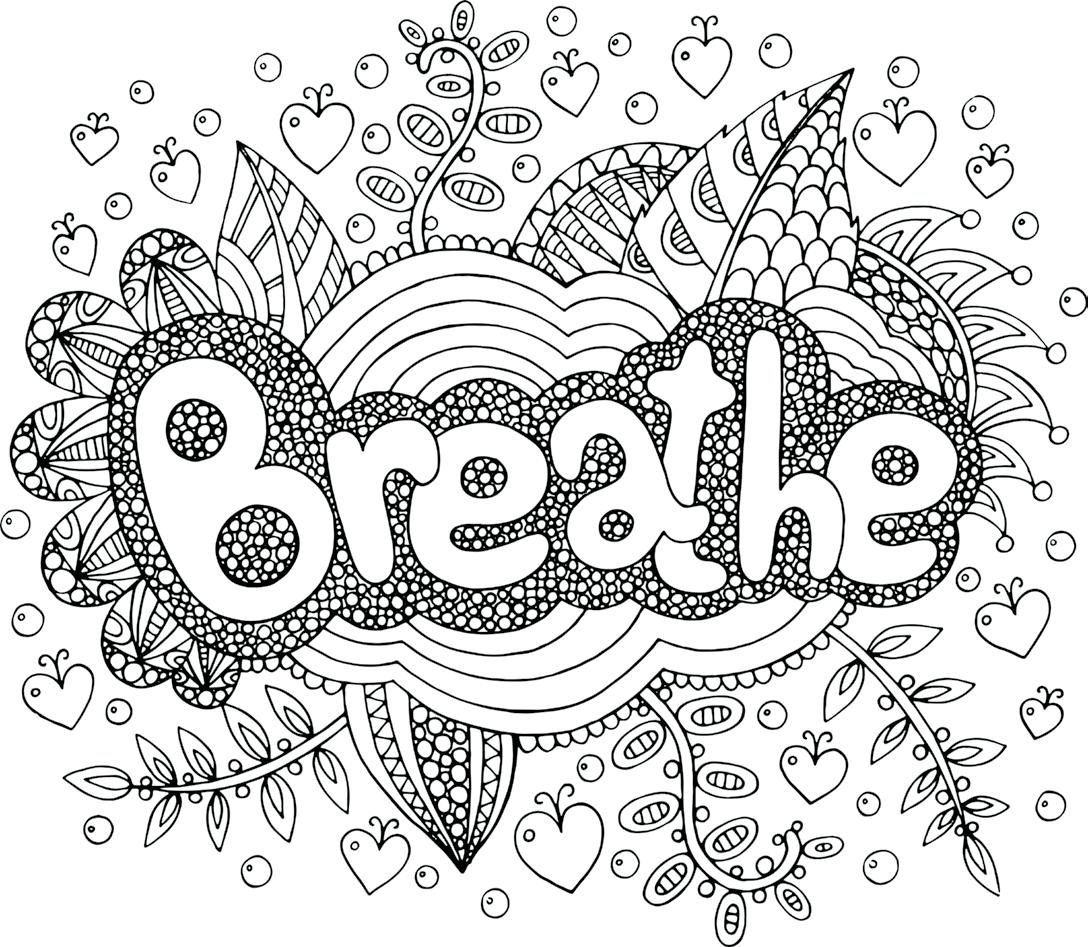
Bruno Groening Circle of Friends Meetings in Phoenix
“A Pathway to a Healthy Body and Soul”
“There’s No Incurable!”
Receive the Healing Energy
Contact 480-313-7659 Call/Text
Bruno-Groening.org
